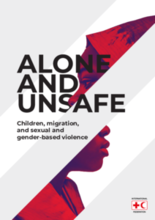This study seeks to improve understanding of the risks and types of sexual and gender-based violence faced by children who migrate on their own, as well as the unfortunate and widespread gaps in protection and assistance for these children. It looks closely at the situation in dangerous or remote locations – places that are fragile, conflict-ridden, underserved and hard to reach, where children may be particularly vulnerable.
The study also identifies actions that are urgently needed, by governments and humanitarian organizations, to better protect and assist children migrating on their own and reduce the risk of sexual and gender-based violence, as called for in the Global Compact on Safe, Orderly and Regular Migration.
The study draws on interviews with specialists from a number of humanitarian agencies, an extensive literature review, and research missions to Afghanistan, Honduras, Niger and Turkey. Importantly it also draws heavily on the experience of Red Cross and Red Crescent volunteers and staff in Benin, Ecuador, Ethiopia, Guatemala, Indonesia and Zimbabwe.

